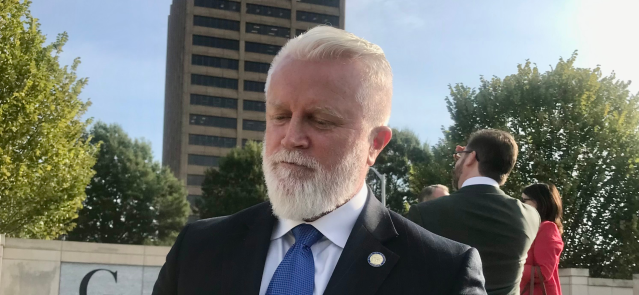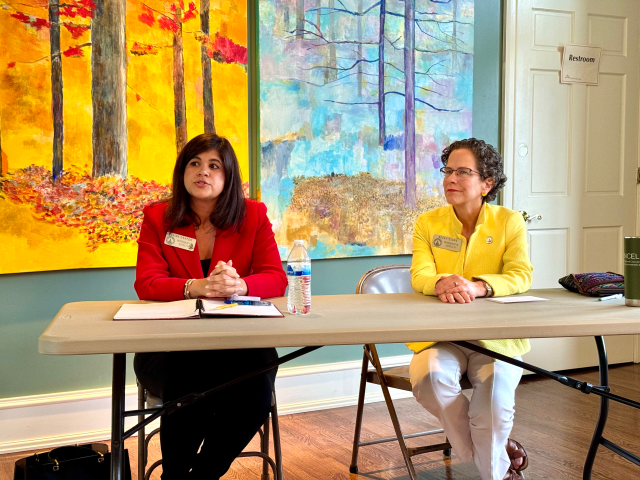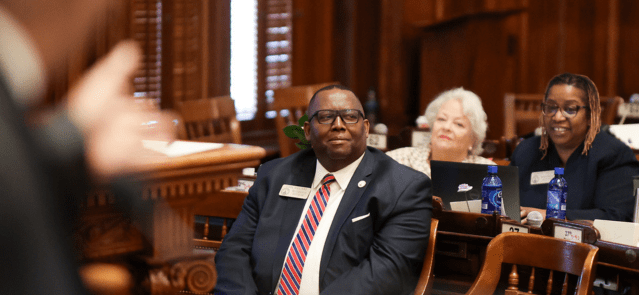Stay ahead of the curve as a political insider with deep policy analysis, daily briefings and policy-shaping tools.
Request a DemoGeorgia Won’t Gamble this Year on Sports Betting, Casinos

Illustration by Brittney Phan (State Affairs)
- State lawmakers took a pass on legalizing sports betting and casinos for another year in Georgia.
- Backers say taxing sports betting and casinos could raise hundreds of millions of dollars for local preschools and college scholarships.
- Opponents worry about addiction issues and economic hardships for low-income gamblers.
The Gist
Once again, Georgia lawmakers won’t roll the dice this year on legalizing more kinds of gambling like sports betting and casinos, leaving potentially hundreds of millions of dollars on the table for preschools, college scholarships and low-income students.
What’s Happening
After almost a decade of false starts, this was supposed to be the year state lawmakers finally paved the way for more gambling in Georgia besides just the lottery, according to many Capitol insiders.
The General Assembly’s most powerful lawmaker, Georgia House Speaker David Ralston (R-Blue Ridge), signaled he’d support a measure letting Georgia voters decide whether to allow casinos, sports betting and horse racing in their communities. It was the first time an elected official of Ralston’s stature threw political weight behind increased gaming.

Pro-gambling lobbyists flocked to the State Capitol. Big-name casino groups eyed prime real estate around Atlanta, Augusta and Columbus. Local professional sports teams and sports-betting companies prepared to divvy up new gaming licenses among themselves.
Then it all fell apart.
A bill to legalize sports betting and a separate measure to potentially allow casinos and horse racing imploded in the last days of vote-wrangling for the 2022 session, which ended April 4. Legislation on forestry taxes replaced the main gambling measure. Once-hopeful lawmakers and gambling backers blamed bitter election-year politics for the defeat.
“It was flat-out nasty at the end,” said state Rep. Ron Stephens (R-Savannah), the leading proponent for the gambling measures. “It wasn’t about educating the kids. It became, ‘If I’m not going to win, you’re not going to win, either.’ ”
Why It Matters
As Georgia’s only form of legal gambling, the lottery has funded local preschool programs and the HOPE scholarship for college students with good enough grades to the tune of around $24 billion since 1992.
Expanding gambling options would likely add to that money pot, supporters say.
Backers of sports betting say it could raise up to $100 million a year from a 20% tax on proceeds from local sports bets. That’s on top of potentially hundreds of millions more from several casinos that could open in the coming years, should lawmakers and local voters give their blessing.
Gambling supporters say the money would pump more funding into preschool programs that have lost teachers due to low salaries, as well as bolster the HOPE scholarship, which has scaled back award amounts in recent years as more students qualify.

Read our story about how Georgia funds preschool programs with lottery dollars by clicking the image above. (Credit: Brittney Phan for State Affairs)
Casinos also mean big business, supporters say. Robert Wright, a former Columbus city council member who has long lobbied for a local casino, said plans in the works for a $200 million Columbus-based “destination resort” could bring 600 to 700 new jobs.
“It’s like bringing a new industry into town,” Wright told State Affairs. “I think it would do so much for the continuous growth of the river community.”
Behind the Scenes
For all the promises of more money, detractors are quick to note gambling has its pitfalls.
Opponents warn about the risks for gambling addiction, particularly if casinos set up shop in poor areas. Many faith-based groups have made it clear to lawmakers that they won’t tolerate sports betting or casinos in Georgia, calling it both a moral vice and harmful to lower-income residents.
Calls to the Georgia Crisis and Access Line from those seeking help with gambling problems more than doubled during the early months of the COVID-19 pandemic, from 999 calls from mid-2018 to mid-2019, to 2,037 calls from mid-2019 to mid-2020, according to the most recently available state data.
“The facts are clear that gambling expansion through devices like sports betting, horse racing and casinos would cause an uptick in addictions, bankruptcies, lost jobs, crime, children at risk, sex trafficking, suicide and a negative impact on personal and governmental economics,” said Mike Griffin, a lobbyist for the Georgia Baptist Ministry Board.
Lawmakers also couldn’t agree on where the money from gambling would ultimately end up, according to insiders who spoke with State Affairs. Some lawmakers wanted gambling dollars to go only toward merit-based scholarships for students such as the HOPE, rather than also to need-based scholarships for kids from low-income families, Stephens said.
Controversial bills this year on guns, elections and what can be taught in schools also soured the appetite for lawmakers to tackle another testy subject like gambling, according to many involved in the debate.
“You’re just left scratching your head about the process,” said Billy Linville, a lobbyist with the Atlanta firm Lexicon Strategies who represented sports teams in supporting the sports-betting measure. “The confidence that this is ever going to happen will certainly be shaken.”
What’s Next?
While gambling hasn’t raised the white flag yet in Georgia, supporters admit confidence that was riding high a few months ago has taken a tumble.
Linville called failures on the sports-betting front this year “a major disappointment” since more than half of states including Tennessee, North Carolina and Mississippi have already approved some form of sports betting.
Meanwhile, sports betting still goes on in Georgia, though it’s done illegally through offshore mobile platforms without regulation and tax benefits for the state, Linville and others say. They expect another push next year for sports betting.
“There are too many companies interested,” said Bruce Bowers, an Atlanta-based lobbyist who pushed for the sports-betting measure. “There’s too much of that activity that goes on illegally for the state not to have an interest in regulating and taxing it.”
After stumbling again this year, casinos likely won’t crop up in Georgia for many years more – if ever.
Rick Lackey, a real estate broker in the Atlanta area, said he’s worked with several casino groups on identifying potential sites in Georgia. One casino representative recently told me that “Georgia is on the back-burner now” for future casino developments, Lackey said.
“Everybody is incredibly disappointed,” Lackey told State Affairs. “I feel like we’ve lost some credibility in Georgia to the casino world.”
Know someone struggling with gambling addiction? Call the Georgia Crisis and Access Line at 1-800-715-4225.
Join the Conversation
What else do you want to know about gambling and state government in Georgia? Share your thoughts/tips by emailing [email protected].
Want to contact your local state legislator about this issue? Find your legislator here.
Read this story for free.
Create AccountRead this story for free
By submitting your information, you agree to the Terms of Service and acknowledge our Privacy Policy.
Weekend Read: Motivated by deep commitment to change, senator from Cataula promotes 369 bills
Shortly after the 2024 legislative session ended in the wee hours of March 29, state Sen. Randy Robertson began working on legislation he plans to introduce during next year’s legislative session, which starts in January 2025.
“I easily spend eight or nine months researching, working through, sitting down with attorneys making sure what I’m doing is constitutional,” the third-term Republican from Cataula told State Affairs. “[I’m] reaching out to subject matter experts to make sure that we are addressing a problem and we are addressing a problem with the right solutions and we’re not creating an additional problem.”
Raised by a single mom, the retired law enforcement officer was surprised to learn that his name was attached to 369 bills, the most introduced in the Senate during the 2024 legislative session.
Robertson said his upbringing and career in law enforcement has helped him focus on the types of bills and decisions he makes whether in the Senate chamber or on the nine committees on which he serves.
His middle name might be “over achiever.”
Robertson is vice-chair of the Senate Public Safety committee and also serves on the appropriations, children and families, ethics and government oversight committees. Last fall, Robertson took on the duties of heading the Senate’s Fulton County Jail subcommittee which is looking into problems at the Atlanta facility where 13 inmates have died in the last year.
In addition to his committee work, Robertson is the majority whip in the Senate, the fourth-highest ranking member of Senate leadership behind the president pro tem, Majority Leader and lieutenant governor.
Robertson spoke with State Affairs about the motivation behind the legislation he has sponsored. The conversation has been edited for clarity and brevity.
Q. You had a productive legislative session. You sponsored or co-sponsored a total of 369 bills during the session, making you the senator who introduced the most pieces of legislation in the Senate. What was your motivation?
A. There’s a big difference between sponsoring and co-sponsoring. Sponsoring is that individual bill that I sat down and have written up and walked through with the attorneys. The co-sponsorships a lot of times are issues I absolutely agree with and I’ll support a sponsor as they carry that bill forward, as far as debating the issue and voting for the issue and things like that.
Q. What legislative goals did you set for yourself for the 2024 session?
A. Well, to basically just finish the drill. In 2023, we passed the Prosecutorial Qualification Commission. And there’d been a change that the [Georgia] Supreme Court had asked us to make. We were able to do that with new legislation. Then, the completion of our bail bond reform legislation that we had done and just a few other things related to adoption and election integrity. Those were my primary drivers.
Q. So you got those things done?
A. We were able to get those done, for the most part. There was a bill on adoption that, for some reason, did not get through. So that’s something we’ll continue to work on. The bill would have allowed an adoptee the opportunity to get their original birth certificate once they turned 18. That was something we were hoping we’d be able to get done and sadly, we weren’t. But we’ll be back championing that legislation next session.
Q. What were you looking to accomplish with bail bond reform?
A. In the previous year, a lot of groups would come forth and they would say there are people in jail who could not afford to make bond. So we have now included in the law that nonprofits can actually establish bonding companies under Title 17 in Georgia. And since they have the opportunity to raise money, this would put them in a better position to help get some of these individuals out of jail that they’re concerned about being left there.
Q. So this will help make that a little bit easier?
A. It’s a matter of risk. Bonding companies would love to get everybody out but the problem with that is some individuals, even though they have bonds, they are at greater risk of flight, of not showing up in court, which would put the bonding companies in a precarious situation. So we tried to explain this to a lot of these groups [who felt people should still be able to get out on bond]. So we expanded the opportunities for other groups that wanted to be a part of the bail bonding community.
Q. What percentage of your bills were passed?
A.I don’t know. I don’t track that. Like I said, a lot of them I was just a co-sponsor on or I signed on with somebody else. I try not to get caught up in that. Some people worry about that. You just support good, quality legislation and understand that what doesn’t get through this year, if it’s something that is still an issue next year, then there’s always that opportunity to bring it back. The most important thing we have to do is get a balanced budget put out for the taxpayers and then those public safety issues, health care issues and things of that nature. Those are the most important things to get out there in session. Once those get out, everything after that a lot of times are just small pieces to correct particular issues.
Q. How has your career in law enforcement shaped your time in the Senate?
A. Well, my experience not only in law enforcement but working in the infrastructure of a local government that is subject to a lot of state laws, rules and regulations has had a huge influence on me.
In law enforcement, you’re out in the real world. And sadly, we have some legislators that really don’t understand what abject poverty is. They don’t understand what abuse is. They’ve never seen domestic violence up close. So I tell everybody, as human beings, it seems like the vast majority of us live in the zoo, where everything is controlled and we get fed, we get water we get really taken care of. But there’s a lot of people still trying to survive out in the jungle, on the Serengeti and in the forest where life is real. And, law enforcement is one of those careers that puts you out there in that environment to see what goes on.
I was primarily raised by a single mother — me and my two sisters. And so my mother worked two jobs. The things that we thought were hard growing up, now I realized were blessings. So now I am able to support a cross section of Georgians, whether they be Democrat, Republican, Independent or whatever. Poverty doesn’t know a political party. Crime doesn’t know a political party. So to have the experiences I’ve had, I feel it’s really benefited me in the Georgia Senate.

Q. What were you hoping to achieve for your constituents, and Georgians in general, through the types of bills that you sponsored or co-sponsored?
A. For the citizens, the one thing I really wanted to accomplish was lower taxes. With the economy the way it is and the recession moving up and down, it doesn’t seem like prices are changing at all. It seems like we’re still paying exorbitant amounts for fuel and other things. So, lowering taxes in Georgia I think was probably the biggest win.
Q. Of all the bills you introduced or co-sponsored, which were you the most proud of?
A. The Prosecutorial Qualification Commission and the bail bond reform.
Q. What was the impetus behind creating the Prosecutorial Qualification Commission?
A. We had an experience in my district with a district attorney. He came in and instead of enforcing Georgia laws and prosecuting Georgia laws, he was just going to pick and choose what he prosecuted and what he didn’t. He violated Georgia law in several ways that he chose to do that and he ended up going to prison.
The problem with that is there should have been something before that where citizens had a voice in getting that district attorney removed other than a recall, which is extremely cumbersome and very, very, very rare in Georgia.
So, just by putting this Prosecutorial Qualification Commission in place, we’re going to address those prosecutors who don’t do their job according to Georgia law. Out of the 50 to 60 prosecutors in Georgia I think we’ve had four that spoke out against it. All the rest of them realize if they’re doing their job, they never have to worry about this.

THE RANDY ROBERTSON FILES
Title: Georgia state senator representing the counties of Troup, Meriwether and Harris as well as parts of Columbus-Muskogee County.
Age: 61
Birthplace: Hamilton
Residence: Cataula
Education: Harris County school system. Columbus State University where he majored in criminal justice. The FBI National Academy and a few other specialty schools throughout his career.
Career: Served 30 years with the Muscogee County Sheriff’s Office, retiring in 2015 as a bureau commander at the rank of major.
Hobbies: He enjoys exercising. He also is an avid reader and collector of books. He estimates he has around 1,800 books.
Family: He and his wife Theresa have three children and five granddaughters. (He recently shaved his beard so that his five-year-old daughter would see his actual face for the first time in her life.)
What would you be doing if you weren’t in the Legislature: “I’d be doing research in public safety, and maybe writing a book or two about how we can make policing better, more professional, how we can avoid the occasional bad apples and reduce crime and uplift citizens all at the same time.”
Top 5 Bill Sponsors in the Georgia Senate

Sen. Randy Robertson, R-Cataula: 369 bills
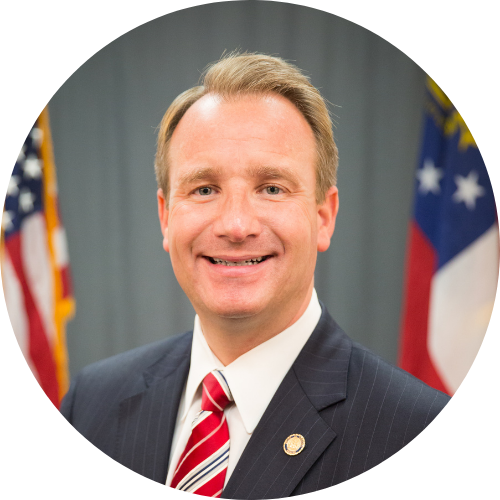
Sen. John Albers, R-Roswell: 365 bills

Sen. Steve Gooch, R- Dahlonega: 361 bills
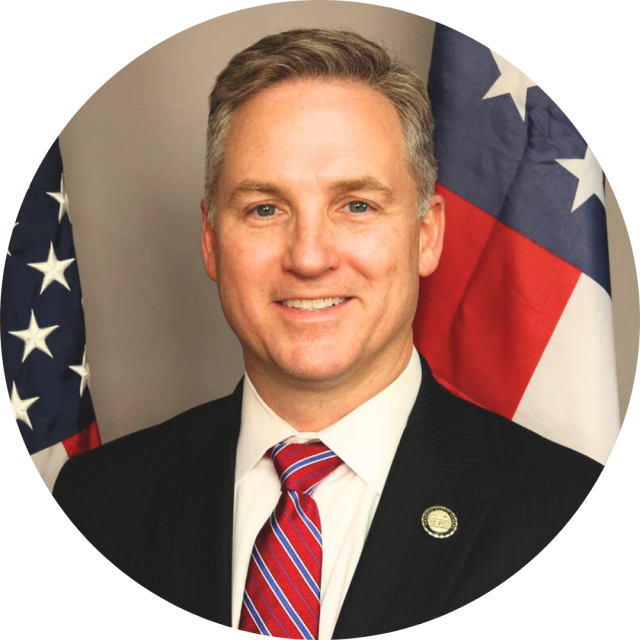
Sen. John Kennedy, R-Macon: 358 bills
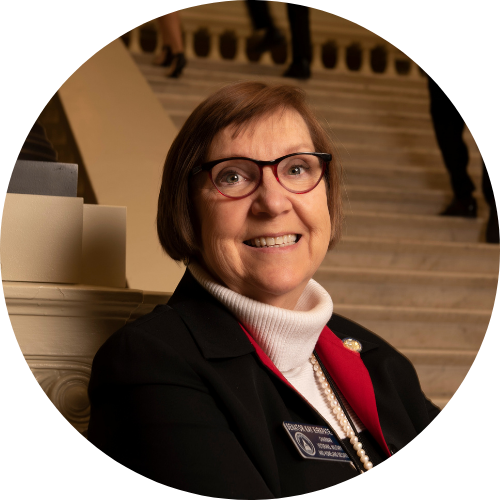
Sen. Kay Kirkpatrick, R-Marietta: 349 bills
Source: LegisScan
Have questions, comments or tips? Contact Tammy Joyner on X @lvjoyner or at [email protected].
And subscribe to State Affairs so you do not miss any news you need to know.
X @StateAffairsGA
Instagram@StateAffairsGA
Facebook @StateAffairsGA
LinkedIn @StateAffairs
Spotted sea trout surged, shorebirds struggled, and the water’s safe for swimming
The Gist
Spotted sea trout flourished, sea turtles and shorebirds struggled, and blue crabs crawled their way out of trouble in ever-warming coastal waters last year. Those are a few of the findings in the Coastal Resources Division’s annual Coastal Georgia Ecosystem Report Card, released today.
What’s Happening
Every year since 2014, the Department of Natural Resources collects data on 12 indicators of coastal ecosystem health that impact humans, fisheries and wildlife and issues a report card.
Based on data collected in 2023, Georgia’s coastal ecosystem this year earned a B, which equates to a “moderately good health score” of 78%, up from last year’s score of 74%.
Click here to see the full 2023 Coastal Ecosystem Report Card.
The ecosystem indicators and scoring methods for the report card were developed with the University of Maryland Center for Environmental Science, which has helped to create other ecosystem health assessments around the country.
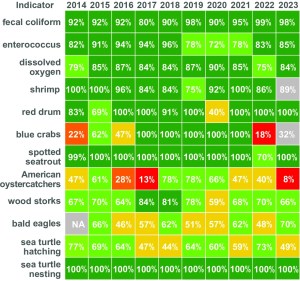
This year, red drum remained plentiful and spotted sea trout numbers improved, as the sea trout count in the Wassaw and Ossabaw sound systems rebounded. The report said a 2016 regulation that increased the minimum catch size limit for sea trout is helping.
Shrimp numbers improved a bit, too, just in time for their recognition as the state’s official crustacean by the Georgia Legislature this year.

According to the Department of Natural Resources, the dockside amount of wild-caught “food shrimp” brought in by commercial fisheries increased to 2.6 million pounds from 2.1 million pounds in 2023 (though the overall dockside value of Georgia shrimp decreased to $9.4 million from $11.3 million, largely due to competition from foreign suppliers of lower-priced, imported frozen shrimp).
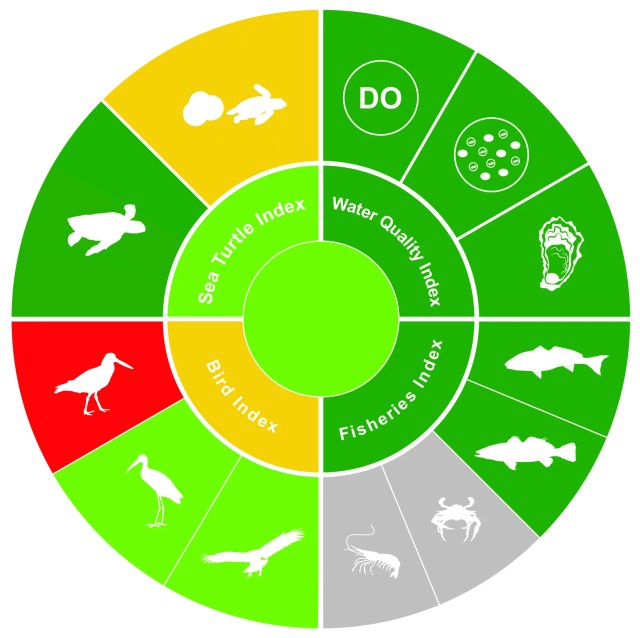
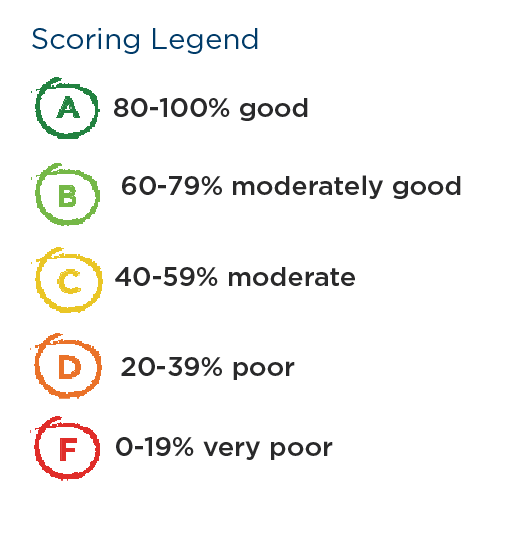
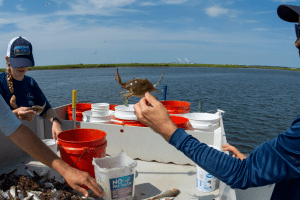
Blue crabs got a D in the report but improved from a score of 18% last year to 32%. Warm coastal waters and increased salinity in the water could explain why crab numbers were low in the survey, but the report also noted its sample size of crab was skewed because its trawling vessel was out of commission for part of 2023. The amount of blue crab caught by commercial fisheries increased to 3.4 million pounds in 2023 from 3.1 million pounds in 2022, with a dockside value of $7 million.
Overall, the dockside value of all commercial fisheries tracked by Natural Resources in Georgia in 2023 was $19.7 million, about $2 million less than in 2022.
The lowest scorers

As was the case last year, shorebirds in general and American oystercatchers in particular were the animals that scored the lowest. Wildlife biologist Tim Keyes said big storms that hit the coast washed out and degraded the beaches and marsh islands where oystercatchers nest. Shorebirds, including wood storks, were also preyed on by raccoons, opossum, coyotes and hogs that live in remote coastal areas.
Keyes said the Coastal Resources Division is working with the Army Corps of Engineers to build new 10-foot-high sand islands and sandbars using dredged-up sediment near Cumberland Island and along the Intracoastal Waterway to give the birds a boost and a better place to roost.

Loggerhead sea turtles, a threatened species, dropped to a C grade from a B, primarily due to increased predation. Sea turtle nesting sites were plentiful once again, with 3,431 loggerhead nests located, and a 52% emergence rate for hatchlings. But many of the eggs and baby turtles were gobbled by wild hogs, raccoons, coyotes before they could make their journey to the sea, according to the Wildlife Resources Division report.
The good news

The report contains good news for humans who like to cavort in coastal waters, as the water quality index received an A, at 89%. Overall indicators show the water is generally safe to swim in and to eat local shellfish, that oxygen levels support fish and other species, and bacteria is at acceptably low levels.
Read this related story:
Have questions or comments? Contact Jill Jordan Sieder on X @journalistajill or at [email protected]
And subscribe to State Affairs so you do not miss an update.
X @StateAffairsGA
Instagram @StateAffairsGA
Facebook @StateAffairsGA
LinkedIn @StateAffairs
Democratic incumbents vie for redrawn House district seat
ATLANTA — Democratic incumbents running in south DeKalb County’s newly drawn District 90 are in a political predicament: Longtime comrades, they now find themselves pitted against each other.
Reps. Saira Draper and Becky Evans met Wednesday on the debate stage at St. John’s Lutheran Church to make the case for why voters should choose them for the newly drawn district in the upcoming May primary.
Mike St. Louis, chair of the Druid Hills Civic Association and moderator of the hourlong debate, lamented the“gratuitous” pairing of two Democratic incumbents in the same district drawn by Republicans who controlled the special legislative session on redistricting last year. The process was an effort to comply with a judge’s order to add more majority-Black districts.
House District 90, which Draper represents, will still include the part of Atlanta that is in DeKalb County, as well as six new precincts in southwest DeKalb that were in District 89, where Evans serves. Each was elected in districts that were and remain majority-Black, solid-blue districts.
No Republican or independent candidates qualified for the 2024 election for the new District 90.
Draper and Evans began and ended Wednesday’s debate acknowledging their respect for each other, and their chagrin over their political predicament, while trying to draw distinctions on their legislative records and strengths.
“This was not something that either of us asked for. It’s not something that either of us wanted,” Draper said. “And to me, it really underscores the fact that we have to get the majority in Georgia.”
Draper, a civil rights attorney serving in the House since 2023, said what makes her “the best person for the job … really boils down to democracy and diversity.” She described herself as an elections and voting rights expert who helped to “flip Georgia blue for the first time in 30 years” during the 2020 presidential election and the 2022 midterms, when she said she “led the voting rights efforts” in Georgia for President Joe Biden and U.S. Sens. Raphael Warnock and Jon Ossoff, for whom she oversaw campaign staff and thousands of volunteers.
Draper said she’s now fighting to bring Democratic majorities back to the state House and Senate, which she estimated will likely take four to six years.
In the meantime, she said she has worked to push through what legislation she can in the Republican-controlled House and cited as a small victory House Bill 1207, a bill she crafted that requires advanced proofing of ballots by candidates and election supervisors. Draper sought out five Republicans as co-signers to gain majority support for the bill, which passed in both chambers and awaits Gov. Brian Kemp’s signature.
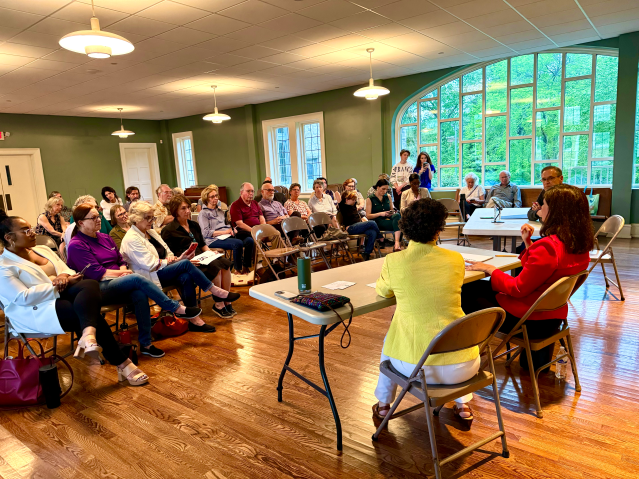
Noting that “diversity is a central tenet to the Democratic Party,” Draper said, “as a woman of color and as an immigrant, I bring perspectives to the table that are underrepresented at the Capitol.”
Draper immigrated to the U.S. when she was 6 years old from England, where her Spanish mother and Pakistani father met. “That makes me Spakistani,” she said, eliciting laughter from the audience. “But it also makes me the only member of the Georgia General Assembly who is a member of the Hispanic caucus and the Asian American Pacific [Islander] caucus.”
Evans, a community organizer and political operative who has served in the House since 2019, emphasized her six years of experience building relationships with fellow legislators and delivering on measures to support education, the environment, gun safety and housing.
“And I’m 100% pro-choice, 100% pro-LGBTQ and 100% pro-health care expansion,” Evans said, adding she is proud of her work developing legislation to promote literacy among school children over the past two years, including writing a bill last year to create the Georgia Council on Literacy and another bill to ensure that children are screened for dyslexia and other reading challenges and that teachers are trained in evidence-based reading and writing instruction.
When her bills didn’t pass from the House to the Senate by the Crossover Day deadline in 2023, Evans said she persuaded Republican lawmakers in the Senate to adopt her legislation, which then passed. She now serves on the 30-member literacy council, which she said is working “to make sure that all of our children will have the broadest possible futures and that they can all learn how to read.”
Evans also said she was “proud to deliver this session $7.4 million in [federal] gun violence prevention awareness funds that will go out to community groups” and to support the passage of a bipartisan Senate bill that will give “[sales] tax breaks [on gun safety devices] where people are using their guns responsibly.” She said she also advocated for adding new funding for school security grants to the education budget, which was approved.
The candidates took similar positions on many issues, both decrying the private school voucher bill they said would drain funds from public schools, and the need for the state to better fund impoverished school districts. They described their individual efforts to curtail gun violence and promote voting rights, as well as detailed their years of experience in ground-level get-out-the-vote efforts in DeKalb County and metro Atlanta. Draper and Evans also expressed measured support of the Atlanta Public Safety Training Center, which they said is needed to train police and first responders.
Among the 40 or so people in the audience, Lora Wuennenberg, 68, a Kirkwood resident and program manager at the humanitarian nonprofit CARE, said she emerged from the debate torn between the two candidates. Noting they have similar positions on the major issues she cares about, including public education, she said Draper, her current representative, impressed her as an “an activist who can mobilize people and is willing to stand up and stand out on some of the issues that may not be getting enough attention.”
“Becky seemed more of a practical, behind-the-scenes organizer, someone who understands the bureaucracy of government and has a lot of established contacts,” Wuennenberg said, noting Evans has worked across the aisle and “found entry points” to get legislation passed. “In the Republican-controlled House, maybe she can be more effective than Saira.”
Wuennenberg said over the next few weeks she’ll follow the candidates and look to see “how Saira thinks she can mobilize support for the bread-and-butter issues that have an impact on people’s lives” in the next legislative session.
Arica Schuett, 36, a Ph.D. candidate in political science at Emory who lives in Druid Hills, said she also needs to spend more time studying the candidates.
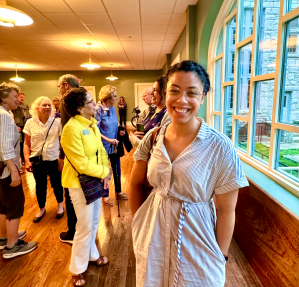
She said Draper’s focus “on mobilizing voters and removing barriers to election participation resonated” with her, while Evans’ “experience and her ability to to work with constituencies that include Republicans is important. So getting a better understanding of how each candidate would manage their position in a really Republican Legislature is what’s important to me.”
Schuett said she plans to dive deeper into their proposed legislation and voting records. “I kind of want to look a little bit more at what they’ve done, right?”
The primary election will take place May 21.
Have questions or comments? Contact Jill Jordan Sieder on X @journalistajill or at [email protected]
And subscribe to State Affairs so you do not miss an update.
X @StateAffairsGA
Instagram @StateAffairsGA
Facebook @StateAffairsGA
LinkedIn @StateAffairs
Barbershop talks and hip-hop summits: Georgia Black legislators’ group has big plans to build coalitions, boost voter rolls
The nation’s largest gathering of Black lawmakers is slated to meet in Atlanta this summer to discuss ways to boost voter participation nationwide ahead of the upcoming fall elections.
The Aug. 2-4 conference theme is “Testing 1, 2, 3.” The meeting will be the precursor to a series of events the Georgia Legislative Black Caucus plans to hold heading into the November presidential election.
“Because we’re the largest Black caucus in the nation, we’re reaching out to all of the caucuses from across the nation,” Rep. Carl Gilliard, D-Savannah, chairman of the 74-member Georgia caucus, told State Affairs. “This is the first time that I think we’re doing a total reach-out to all of the Black caucuses. We share a lot of similarities. Whether it’s voter suppression in Georgia, the same laws are going to be tried in Tennessee and the same laws are going to be tried in Florida. We share a lot of commonalities.”
Next week, for instance, the Georgia caucus is scheduled to issue a statement supporting efforts to pass a hate crimes bill in South Carolina. The bill passed in the House but stalled in the Senate, Gilliard noted.
Over 700 Black legislators represent about 60 million Americans, according to the National Black Caucus of State Legislators. In addition to the Georgia caucus, Black caucuses exist in nearly three dozen states.
Shortly after the August convention, the Georgia Legislative Black Caucus will embark on a 14-city tour throughout Georgia to focus on “getting out the vote.”
“We’re not going to tell them who to vote for,” Gilliard said of voters. “But what is happening right now is no one is talking to the people. And if the election were held today, we all would be in trouble because no one is talking or meeting the people where they’re at.”
The tour is a continuation of various actions the Georgia Legislative Black Caucus has taken this year to align with other organizations of people of color on common causes.
In March, the caucus joined forces with the Asian American Pacific Islander and Hispanic caucuses for a tri-caucus town hall. It was the first time the three groups have aligned. The Black caucus also has “reached out to partner with the Hindus of North America population and the diaspora,” Gilliard said.
“What we’re trying to do is form a coalition to get to as many diverse groups of people as we can,” he said.
Gilliard said the lack of individual and collective involvement in communities he’s seeing concerns him. It’s a far cry from four years ago.
In 2020, the deaths of Ahmaud Arbery, an unarmed Black man murdered while jogging in Glynn County, and Breonna Taylor, a Black woman killed by Louisville, Kentucky police serving a no-knock warrant for drug suspicion, led to more than 450 protests nationwide and on three continents.
That same year, former Georgia gubernatorial candidate Stacey Abrams led an effort to increase the voter rolls for the 2020 presidential election. Fair Fight and the New Georgia Projects, two groups Abrams founded, registered more than 800,000 new voters.
That level of community and political engagement has since subsided, Gilliard said.
“People don’t know what’s going on,” Gilliard said. “No one is really talking to the people. You’ve got a presidential election. I’m talking about on both [political] sides. There are rallies and different events being held, but nobody has gone to the barbershop. No one has gone to the community centers or the neighborhoods. We’re going to be empowering those communities by going and taking those townhall meetings right where they’re at, not in a big municipality but in community centers and neighborhoods.”
The caucus also plans to hold a hip-hop summit to reach young people, many of whom are skeptical of both political parties.
“They’re forming their own opinions,” Gilliard said. “They’re saying, ‘Forget about Trump. We need to hear something different.’ That’s just their perception. That’s why I’m really quietly championing the young candidates behind the scenes who are running right now because we need young leaders.
“We have to get as many people together, but we also have to get them ready to work.”
Have questions, comments or tips? Contact Tammy Joyner on X @lvjoyner or at [email protected].
And subscribe to State Affairs so you do not miss any news you need to know.
X @StateAffairsGA
Instagram@StateAffairsGA
Facebook @StateAffairsGA
LinkedIn @StateAffairs

